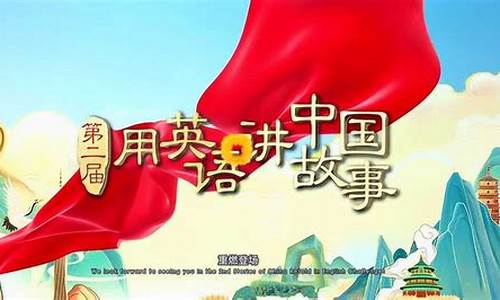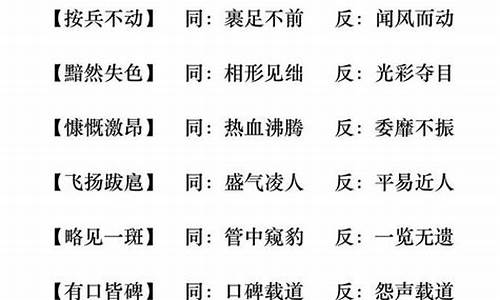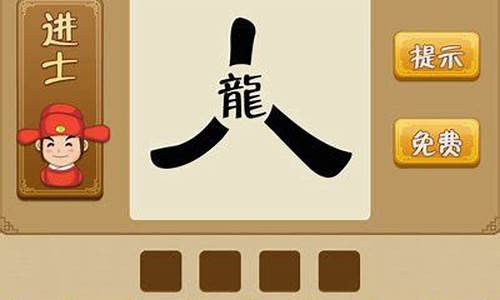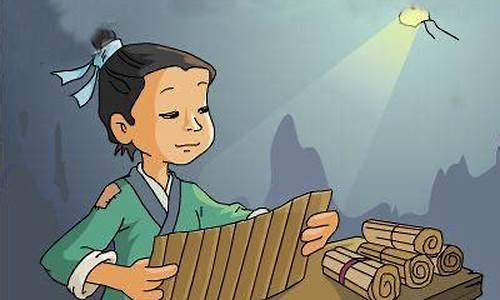您现在的位置是: 首页 > 成语接龙大全 成语接龙大全
用英语讲中国成语故事_用英语讲中国成语故事视频
ysladmin 2024-05-15 人已围观
简介用英语讲中国成语故事_用英语讲中国成语故事视频 接下来,我将针对用英语讲中国成语故事的问题给出一些建议和解答,希望对大家有所帮助。现在,我们就来探讨一下用英语讲中国成语故事的话题。1
接下来,我将针对用英语讲中国成语故事的问题给出一些建议和解答,希望对大家有所帮助。现在,我们就来探讨一下用英语讲中国成语故事的话题。
1.英文版成语故事有哪些?
2.用英语说成语故事急,要短的,长的不行
3.用英语说成语故事
4.英语版中国成语故事带翻译,短一点
5.英语成语故事:黔驴技穷
6.英语的成语故事

英文版成语故事有哪些?
英文版的《守株待兔》如下:Once upon a time, there was a farmer. One day, while he was working in the fields, he saw a hare run into a tree stump accidentally and die of a broken neck.
从前,有一个农夫。一天,在他耕田的时候,忽然跑过来一只野兔,恰好碰在一个树桩上,脖子折断死了。
The farmer took the hare home and cooked a delicious meal for himself.
农夫把兔子拾回家去,美美地吃了一顿兔肉。
That night he thought: "I needn't work so hard. All I have to do is wait every day by the stump to pick up the hare that runs into it."
当晚,他就想:“我何必辛辛苦苦的种地呢?每天在树桩旁等着捡撞死的野兔就好了”。
So from then on he gave up farming, and stood by the tree stump waiting for the hare to come and run into it.
于是他从此不再耕种,每天在树桩旁等待野兔的到来。
But from then on, he never saw another hare run into the tree stump.
但是,从那以后,他再没有发现一只野兔撞在树桩上。
成语寓意
野兔撞在树桩上死去,这是非常偶然的事,它并不意味着,别的野兔也一定会撞死在这个树桩上。可是,这个农夫竟然以偶然当作必然,不惜放下农具,任其耕田荒芜,专等偶然的收获。
这个故事告诫我们:不要存有侥幸心理,不要总想着不劳而获,如果不付出努力,而寄希望于意外之财,结果只能是竹篮打水一场空。我们的生活是要靠自己的双手去一点点地创造的,如果总想不劳而获,那么人生就会像这个宋国人的田地一样荒废掉。
用英语说成语故事急,要短的,长的不行
掩耳盗铃Plugging One's Ears While Stealing a Bell
春秋时侯,晋国贵族智伯灭掉了范氏。有人趁机跑到范氏家里想偷点东西,看见院子里吊着一口大钟。钟是用上等青铜铸成的,造型和图案都很精美。小偷心里高兴极了,想把这口精美的大钟背回自已家去。可是钟又大又重,怎么也挪不动。他想来想去,只有一个办法,那就是把钟敲碎,然后再分别搬回家。
小偷找来一把大大锤,拼命朝钟砸去,咣的一声巨响,把他吓了一大跳。小偷着慌,心想这下糟了,这种声不就等于是告诉人们我正在这里偷钟吗?他心里一急,身子一下子扑到了钟上,张开双臂想捂住钟声,可钟声又怎么捂得住呢!钟声依然悠悠地传向远方。
他越听越害怕,不同自由地抽回双手,使劲捂住自已的耳朵。“咦,钟声变小了,听不见了!”小偷高兴起来,“妙极了!把耳朵捂住不住就听不进钟声了吗!”他立刻找来两个布团,把耳朵塞住,心想,这下谁也听不见钟声了。于是就放手砸起钟来,一下一下,钟声响亮地传到很远的地方。人们听到钟声蜂拥而至把小偷捉住了。
故事出自《吕氏春秋?6?1自知》“掩耳盗钟”被说成“掩耳盗铃”,比喻愚蠢自欺的掩饰行为。
Plugging One's Ears While Stealing a Bell
During the Spring and Autumn period,Zhi Bo of the State of Jin destroyed Fan's family.Taking advantage of this occasion,a man went to Fan's house and tried to steal something.As soon as the man entered the gate,he saw that there hung a big bell in the courtyard.The bell was cast in high-quality bronza,and was beautiful in design and shape.The theif was very glad,and decided to carry this beautiful bell back home.But no matter how hard he tried,he could not move the bell,because the bell was both big and heavy.He thought and thought again,and believed there was only one way to solve the problem.He had to break the bell to pieces before he was able to carry them back to his home separately.
The thief found a big iron hammer,with which he struck the bell with all his might.The striking produced an enormous crashing sound,which might.The striking produced an enormous crashing sound,which made the thief terribly frightened.The thief got flurried,thinking that it was too bad to have produced the crashiing sound which would himself on the bell,trying to muffle the crashing sound with his arms.But how could the crashing sound of the bell be muffled?The crashing sound still kept drifting melodiously to distant places.The more he listened to the sound,the more frightened hw became.He xubconsciously shrank back,and covered his ears hard with his hands."Hey,the sound becomes fainter,inaudible,"the thief became cheerful at once," wonderful!The sound of the bell can not be heard when the ears are covered."He immediately got some odd bits of cloth,made two rolls with them,and had his ears plugged with the two cloth rolls.He thought that in this way nobody could hear the sound of the bell.Feeling relieved,he began striking the bell,one blow after another.The resounding sound of the bell was heard at distant places,and finally people caught the thief by gracing the sound.
This story comes from"Knowing Yourself" in The Annals by Buwei,written just before the Qin Dynasty(221-207 B.C.)was founded.Allegedly,when Li Yuan,Emperor Gao Zu of the Tang Dynasty(618-907),read this story,he felt it simply ridiculous and said,"This is what is called plugging one's ears while stealing a bell."
Later,people have used the set phrase "plugging one's ears while stealing a bell" to refer to the ignorance and foolishness of the person who deceives himself as well as others.
用英语说成语故事
画龙点睛。字面的意思是画龙之后再点上眼睛。这个成语多用于说话写作那么关于它的历史典故是怎样的呢?一起来看看吧:
Mr. Li is a good painter. One day he draws a beautiful dragon without eyes.
Mr. Zhou looks at the picture and says, “The dragon has no eyes. It isn’t a good picture.”
But Mr. Li smiles and says, “If I add eyes to the dragon, it will fly away.”
Mr. Zhou shakes head and says, “You are boasting. I don’t believe you.”
Mr. Li isn’t angry. He holds the paintbrush and adds eyes to the dragon. Woe! The dragon really flies.
李先生是位很好的画家。一天画了一条栩栩如生的龙,但是这只龙没有眼睛。
周先生见了说:“这条龙没有眼睛。这不算一张好画。”
可是李先生笑着说:“如果我给它加上眼睛,它就会飞走了。”
周先生摇头说:“你吹牛。我不相信。”
李先生也不生气,只是拿起笔给龙点上眼睛。哇!龙真的飞走了。
英语版中国成语故事带翻译,短一点
东施效颦
说春秋时候,越国有个名叫西施的姑娘,她非常美丽、漂亮,一举一动也很动人。他有心口疼的疾病,犯病时总是用手按住胸口,紧皱眉头。因为人们喜欢她,所以她这副病态,在人们眼里也妩媚可爱,楚楚动人。 西施的邻村有个丑姑娘叫东施,总是想方设法打扮自己。有一次在路上碰到西施,见西施手捂胸口,紧皱眉头,显得异常美丽。她想难怪人们说她漂亮,原来是做出这种样子。如果我也做这个姿势,肯定就变漂亮了。于是她模仿西施的病态。结果人们见了原来就丑的她,现在变成这种疯疯癫癫的样子,象见了鬼一样,赶紧把门关上。Aping a Beauty (Dong Shi Xiao Ping)
Xi Shi, a famous beauty, had a pain in her bosom, so she had a frown on her face when she went out. An ugly girl named Dong Shi who lived nearby saw her and thought she looked very beautiful. Therefore when she went home, she also put her hands on her bosom and had a frown on her face.
When a rich man in the neighbourhood saw her, he shut his doors tightly and did not go out. When a poor man saw her, he took his wife and children and gave her a wide berth.
She only knew Xi Shi's frown looked beautiful but she did not know the reason for its beauty.
英语成语故事:黔驴技穷
塞翁失马Blessing or Bane
战国时期,靠近北部边城,住着一个老人,名叫塞翁。塞翁养了许多马,一天,他的马群中忽然有一匹走失了。邻居们听说这件事,跑来安慰,劝他不必太着急,年龄大了,多注意身体。塞翁见有人劝慰,笑了笑说:“丢了一匹马损失不大,没准会带来什么福气呢。”
邻居听了塞翁的话,心里觉得很好笑。马丢了,明明是件坏事,他却认为也许是好事,显然是自我安慰而已。过了几天,丢失的马不仅自动返回家,还带回一匹匈奴的骏马。 邻居听说了,对塞翁的预见非常佩服,向塞翁道贺说:“还是您有远见,马不仅没有丢,还带回一匹好马,真是福气呀。” 塞翁听了邻人的祝贺,反而一点高兴的样子都没有,忧虑地说:“白白得了一匹好马,不一定是什么福气,也许惹出什么麻烦来。” 邻居们以为他故作姿态纯属老年人的狡猾。心里明明高兴,有意不说出来。 塞翁有个独生子,非常喜欢骑马。他发现带回来的那匹马顾盼生姿,身长蹄大,嘶鸣嘹亮,膘悍神骏,一看就知道是匹好马。他每天都骑马出游,心中洋洋得意。 一天,他高兴得有些过火,打马飞奔,一个趔趄,从马背上跌下来,摔断了腿。邻居听说,纷纷来慰问。 塞翁说:“没什么,腿摔断了却保住性命,或许是福气呢。”邻居们觉得他又在胡言乱语。他们想不出,摔断腿会带来什么福气。 不久,匈奴兵大举入侵,青年人被应征入伍,塞翁的儿子因为摔断了腿,不能去当兵。入伍的青年都战死了,唯有塞翁的儿子保全了性命。Near China's northern borders lived a man well versed in the practices of Taoism. His horse, for no reason at all, got into the territory of the northern tribes. Everyone commiserated with him.
"Perhaps this will soon turn out to be a blessing," said his father.
After a few months, his animal came back, leading a fine horse from the north. Everyone congratulated him.
"Perhaps this will soon turn out to be a cause of misfortune," said his father.
Since he was well-off and kept good horses his son became fond of riding and eventually broke his thigh bone falling from a horse. Everyone commiserated with him.
"Perhaps this will soon turn out to be a blessing," said his father.
One year later, the northern tribes started a big invasion of the border regions. All able-bodied young men took up arms and fought against the invaders, and as a result, around the border nine out of ten men died. This man's son did not join in the fighting because he was crippled and so both the boy and his father survived.
英语的成语故事
In ancient times there were no donkeys in Guizhou province. Somebody brought a donkey from somewhere and tied it to a tree at the foot of a mountain.
A tiger saw the donkey, and thought that it must be a fearsome(可怕的) monster. It hide behind a tree and spied on the donkey.
When the donkey brayed(叫) , the tiger was frightened, thinking that the donkey was about to devour(吞食,毁灭) it. After a while, seeing that the donkey had not moved, the tiger approached it and teased it. The donkey became angry, and kicked the tiger.
The tiger thought to itself: "Its then all it is capable of?" It then jumped on the donkey and ate it.
This idiom is used to mean that one has exhauseted one's skills.
过去贵州(黔)这个地方没有驴。有个多事的人用船运来了一头驴,运来后却没有什么用处,就把驴放到山脚下。
一只老虎看见了驴,以为这个躯体高大的家伙一定很神奇,就躲在树林里偷偷观察着,后来又悄悄走出来,小心翼翼地接近驴,不知道驴子的底细。
有一天,驴叫了一声,大虎大吃一惊,远远躲开,以为驴要咬自己了,非常恐惧。然而,老虎反复观察以后,觉得驴并没有什么特殊本领,而且越来越熟悉驴的叫声了。老虎开始走到驴的前后,转来转去,还不敢上去攻击驴。以后,老虎慢慢逼近驴,越来越放肆,或者碰它一下,或者靠它一下,不断冒犯它。驴非常恼怒,就用蹄子去踢老虎。
老虎心里盘算着:“你的本事也不过如此罢了!”非常高兴。于是老虎腾空扑去,大吼一声,咬断了驴的喉管,啃完了驴的肉,才离去了。
唉!那驴的躯体高大,好像有德行;声音洪亮,好像有本事。假如不显出那有限的本事,老虎虽然凶猛,也会存有疑虑畏惧的心理,终究不敢攻击它。现在落得如此下场,不是很可悲吗?
少儿英语成语故事:毛遂自荐
画蛇添足
An official of the ancient State of Chu awarded a pot of wine to his men after the ceremony of Spring Sacrifice. One man said, “We have only one pot of wine. It's not enough for all of us but sufficient for one. Let's determine who'll have the wine by drawing a snake on the ground. He who finishes first will have the wine.”
The others agreed. Very soon, one man finished his snake. He was about to drink the wine when he saw the others were still busy drawing. He said complacently,“How slowly you are! I still have enough time to add feet to my snke.” But before he finished the feet, another man finished his snke and grabbed the pot from him, saying,“Whoever has seen a snake with feet? Yours is not a snke. So the wine should be mine!” He drank the wine. The man adding the feet to the snake had to give in and could only regret his foolishness.
楚国有一个官员,在春天祭过了祖宗之后,便将一壶酒赏给他的办事人员喝。有人提议:“我们只有一壶酒,肯定不够我们大家喝的,一个人喝倒是绰绰有余。我们每人在地上画一条蛇,谁画得最快,就把这壶酒给他。” 大家都同意了。
有一个人很快就把蛇画好了。他正打算喝这壶酒时,看见别人都还忙着画呢。他就得意扬扬地说:“你们画得好慢呀,等我再画上几只脚吧!” 他的蛇脚还没画完,另一个人已经把蛇画好了。那人把酒壶夺了过去说:“有谁见过长脚的蛇?你画的不是蛇,这壶酒应该是我的了。”说罢,就喝起酒来。那个给蛇画脚的人没办法,只能懊悔自己的愚蠢。
一鸣惊人
In the Warring States Period, Duke Wei of Qi neglected state affairs, for the first three years of his reign, giving himself over to dissipation. One of his ministers, Chun Yukun who had a good sense of humour, said to him: 'There is a big bird which has neither taken wing nor sung for three years.' The duke answered, 'Once that bird starts to fly and sing, it will astonish the world.' The duke thereupon devoted himself to his duties and built his state up into a powerful one.
战国时代,齐威王即位后做了三年国君,只顾享乐,不理政事。有个善于说笑话的人叫淳于髡,一天对齐威王说:“城里有一只大鸟,三年不飞也不叫,你知道这是什么道理?”齐威王说:“这鸟不飞则罢,一飞就冲天;不鸣则罢,一鸣就惊人。”在淳于髡的激发下,齐威王开始治理国家,取得很大成绩,齐国的声威一直保持了几十年。
杞人忧天
In the Spring and Autumn Period, in the State of Qi there was a man who always let his imagination run away with him. One day he even worried that the sky would fall on his head. He was so worried that he could neither eat nor sleep. Later, someone persuaded him that his fears were Ground-less.
春秋时代,杞国有一个喜欢胡思乱想的人。一天,他竟然想到,天会塌下来,地会陷下去,自己到哪里去安身?这个人越想越害怕,整天愁眉苦脸,坐立不安,白天吃不下饭,晚上睡不着觉。后来有人耐心地开到他,他才放下了心。
精卫填海
Once upon a time, the youngest daughter of Emperor Yan, legendary ruler of primitive China, went boating on the Eastern Sea. While she was enjoying herself, a strong wind rose on the sea and her boat capsized. Just before she was buried by the surging waves, her spirit turned into a beautiful bird. As it flew over the roaring sea, it cried sadly in the sound "jinwei, jingwei". That was why people called it "Jingwei".
The bird lived on a mountain near the sea. It hated the sea so much that it decided to fill it up. Every day, it flew to and fro between the mountain and the sea, carrying in a twig or a pebble from the mountain and dropping it into the sea.
One day, the roaring sea said to Jingwei, "Poor little bird, stop doing that meaningless thing! You'll never fill me up." Jingwei replied, "I'll fill you up no doubt! I will, even if it'll take me thousands of years! I'll fight on until doomsday!"
The brave little bird kept carrying twigs and pebbles from the mountain to the Eastern Sea without taking a rest.
From this fable comes the idiom "The bird Jingwei trying to fill the sea". We use it to describe people who are firm and indomitable and will not stop until they reach their goal.
从前,炎帝(传说中中国原始社会的统治者)的小女儿在东海上划船。正当她划得高兴时,海面上突然升起一阵大风,把她的小船弄翻了。就在她要被汹涌的波浪吞 没时,她的灵魂变成了一只美丽的小鸟。它飞过那咆哮的海面,伤心的叫着"精卫,精卫"的声音。所以人们就叫她"精卫"。
精卫鸟住在靠海的一座山上。它非常恨大海,所以决心要把它填平。它每天来回于山海之间,把从山上衔来的小树枝和小石子扔在大海里。
一天,咆哮的大海对精卫说:"可怜的小鸟,停止你那无谓的举动吧!你是永远都填不平我的。" 精卫回答说:"我当然会把你填平的!即使这需要千千万万年的时间,我也一定会斗争到底,直到你的末日来临!"
这只勇敢的小鸟继续从山上衔来小树枝和小石子,扔到东海中,从未有片刻休息。
"精卫填海"这个成语就是由这个传说而来的,形容那些坚定不移,不屈不挠,不到目的决不罢休的人。
volunteer to do sth/recommend oneself毛遂自荐
In the Warring States Period, the State of Qin besieged the capital of the State of Zhao.战国时代,秦国军队攻打赵国的都城。
Duke Pingyuan of Zhao planned to ask the ruler of the State of Chu personally for assistance.He wanted to select a capable man to go with him. 赵国的平原君打算亲自到楚国去请救兵,想挑选一个精明能干的人一同前去。
A man called Mao Sui volunteered. 有一个名叫毛遂的人,自告奋勇愿意同去。
When the negotiactions between the two states were stalled because the ruler of Chu hesitated to send troops, Mao Sui approached him, brandishing a sword. At that, the ruler of Chu agreed to help Zhao, against Qin.平原君到楚国后,与楚王谈了半天,没有一点结果。毛遂怒气冲冲地拿着宝剑,逼近楚王,终于迫使楚王答应出兵,与赵国联合共同抵抗秦国。
This idiom means to recommend oneself.“毛遂自荐”这个成语用来比喻自己推荐自己,不必别人介绍。
文化链接
英文中“毛遂自荐”可以说成“volunteer to do sth”,“volunteer”既可以作名词,也可以作动词,作名词时的意思是“志愿者”,作动词就可以解释为“志愿去做什么事”,就是“毛遂自荐”啦~
我们来一起看几个例句吧~
Our company volunteered to support and help the victims. 我们的公司毛遂自荐来帮助受灾灾民。
You can volunteer to work one or multiple shifts。你可以毛遂自荐做单班制,也可以选择多班制。
好了,今天关于“用英语讲中国成语故事”的话题就讲到这里了。希望大家能够对“用英语讲中国成语故事”有更深入的认识,并从我的回答中得到一些启示。如果您有任何问题或需要进一步的信息,请随时告诉我。
下一篇:英语成语小故事带翻译









